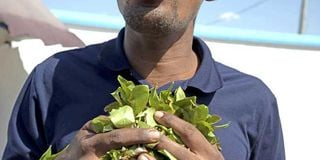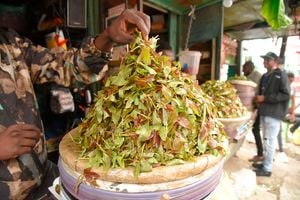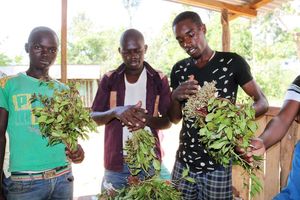
A man holds a handful of muguka at the Kongowea Market in Mombasa yesterday.
For decades, thousands of residents from the expansive Mbeere area in Embu County have been relying on muguka farming to earn a living.
The recent ban imposed on its sale, transportation and distribution in Mombasa and Kilifi counties has, therefore, dealt them a devastating blow.
Statistics obtained from Embu County indicate that at least 65,000 residents are engaged in muguka production and the number is increasing.
Coast counties serve as the biggest markets for the produce that is estimated to contribute some Sh22 billion to the county’s economy.
The muguka value chain, Embu Governor Cecily Mbarire said, contributes approximately Sh1 million to the Mombasa economy per day in transport levies.
Muguka farmers, and other players who have invested heavily in its value chain, lost a lot of money in the one week that the ban was in force before the Embu High Court suspended it.
“I have lost Sh100,000,” Mr Joseph Ireri from Muraru village told the Nation.
"Muguka is the crop that puts food on the table, it also enables us to educate our children and meet other financial obligations easily," said Mr Ireri.
The residents recounted how they lived in horrible conditions before they ventured into Muguka business.
One kilogramme of the stimulant goes for between Sh300 and Sh600. During the dry seasons, it sells at up to Sh1,000 a kilo.
"We used to live in dilapidated grass-thatched and mud-walled huts. But now we live in stone buildings and we don't regret growing muguka which is our green gold," said Mr Ireri.
"I previously farmed maize but it was not profitable. I used Sh15,000 on my two- acre maize farm but I didn't harvest anything. There was no enough rain and all my maize dried up. This happened for two seasons and I had to give up maize farming. Muguka does well even without much rain,” Ms Mary Muthoni said.
Mr Alexander Kithagu,53, lamented that he incurred huge losses due to the ban.
"My produce went to waste in the farm and I lost Sh150, 000," said Mr Kithagu. Farmers usually wake up at 6am to pick their crop and deliver it to the market for sale to brokers who transport it to the coast.
However, on May 22, they woke up to find there were no buyers for their produce.
“That day, we could not deliver our harvests to Muraru town, the largest muguka collection centre. We were worried but there was nothing we could do," said Mr Kithagu.
Unlike tea or coffee, he said, muguka farmers are paid promptly on delivery.
Mr Alexander Githinji,31, expressed fears that his two children may not complete their education should muguka farming be banned entirely.
“Muguka is my only source of income. The money I get is used to educate my children and to make my life comfortable," said Mr Githinji.
Muguka is a miraa (khat) variety that is green and bushy. It is a stimulant that produces a mild high when chewed. The crop is fast growing and does well in dry lowlands of Embu County, making it less vulnerable to erratic weather conditions.
Ms Mbarire has expressed her concerns over the ban, saying the county government had engaged a team of lawyers to defend muguka farmers.
Ms Mbarire said while the people of Embu are farmers, those from Meru and other areas in the Central region dominate the business as middlemen and transporters. On Monday night, Ms Mbarire led a delegation of leaders to State House to see President William Ruto over the muguka crisis.
The President held talks with the Embu leaders and assured them of his support.
“We met with the President and he agreed with us that muguka farming is legal and should not be interfered with,” said Senator Alexander Mundigi.
The President, he said, assured them the allocation to support miraa production will be raised from Sh135 million to Sh450 million. The Senator who is also the vice-chairman of the Agriculture Committee in the House, said muguka has played a key role in improving the lives of Embu residents.
"I'm one of the beneficiaries of muguka. My parents paid my school fees using muguka and that is why I acquired a good education which enabled me to have a good life. Muguka is not a drug and, as leaders from this region, we shall continue supporting it,” said Mr Mundigi.
A Bill has been tabled in the Senate to provide a legal framework for value addition. Once passed, muguka will be used to make wines, juices, sweets and medicines.
The Kiambeere MCA Lenny Masters Mwaniki told the coast governors to respect the law.
“Muguka is not an outlawed crop and the ban is illegal," he said.
“Why should coast governors declare muguka illegal when the law legalises it?” he posed.
Farmers deliver 36 tonnes of muguka to the coast daily, earning them Sh10.8 million.












